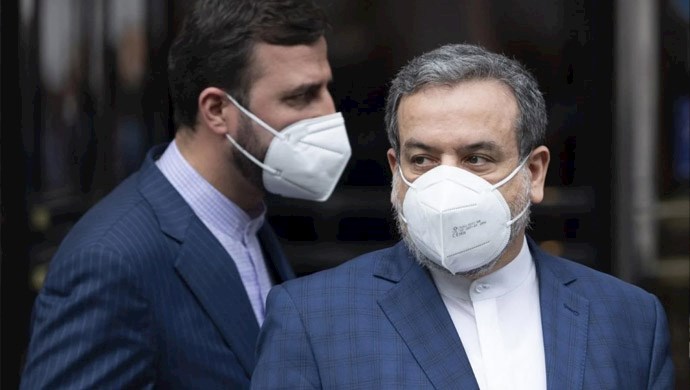Analysis by PMOI/MEK
Iran, June 3, 2021—In Wednesday’s cabinet meeting, Iranian regime president Hassan Rouhani claimed that nuclear talks in Vienna are progressing in a satisfying manner. He also explicitly state that regime supreme leader Ali Khamenei is directly “guiding” the talks, which speaks a lot to how much Khamenei is banking on the outcome of the nuclear negotiations.
But despite Rouhani’s claims, others in the regime are of a different opinion when it comes to the results that the nuclear talks have so far yielded.
On June 2, deputy foreign ministers Abbas Araghchi said that the Vienna talks could proceed, but “the details and positions of the establishment must be considered.” In other words, he said that the talks are faced with a deadlock and the only way out is for the regime to back down from its position. Araghchi was also full of doubt in facing the media and admitted that the parties to the talks are not on the same page yet.
What is the regime’s position? The regime wants conditions to return to the 2015 Joint Comprehensive Plan of Action (JCPOA) and all sanctions to be lifted, including non-nuclear-related sanctions. In return, the regime does not want to make any concessions aside from the limited restrictions imposed by the JCPOA.
But given the regime’s belligerent behavior in recent years, especially in spreading and funding terrorism and committing abhorrent human rights violations, it has become evident that the JCPOA did not live up to its goal of preventing the regime’s threats to global peace and security. Even the most enthusiastic proponents of rapprochement with the Iranian regime are having a hard time defending the narrative of unconditionally lifting all sanctions against the regime.
Mikhail Ulyanov, Russia's representative at the nuclear talks, admitted that there seems to be no agreement on any issue. Prior to this, U.S. Secretary of State Antony Blinken had refuted reports that the Vienna talks were in their final stages. And U.S. National Security Advisor Jake Sullivan had also acknowledged that Washington and Tehran have not reached any agreement.
Meanwhile, countries in the Middle East region, who have a lot at stake because of the regime’s nefarious activities on their soil, are closely watching the talks and are not satisfied with status quo returning the JCPOA era, where Tehran had a blank check to cause mayhem and destruction in the region. And the same goes for the representatives of the U.S. Congress, who have called on the Biden administration to avoid giving any concessions to the regime that could enable its malign behavior.
Meanwhile, the regime’s own officials and experts are voicing concern and despair. On June 2, the state-run Jahan-e Sanat newspaper quoted international relations expert Ali Bigdeli as saying, “The JCPOA negotiations are almost in a state of deadlock.”
Meanwhile, Foad Izadi, another regime-linked political analyst, complained that the regime’s recent agreement with the International Atomic Energy Agency will make it look weak because it is in breach of the Majlis’s (parliament) ratified bill to predicate everything on the lifting of sanctions.
Therefore, what is clear is that, contrary to what Rouhani has said, the Vienna talks are in a state of deadlock because the regime will not back down from its maximalist claim. And the problem is that the regime is in such a weak state that if it backs down from any of its nefarious activities, it will lead to implosion and disarray in its own ranks. And with its own forces losing their hold on the situation, the way will be opened for nationwide uprisings by a population whose rage has only been contained by the regime’s brutal security forces.





